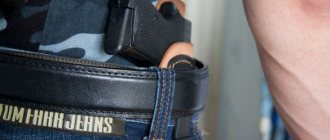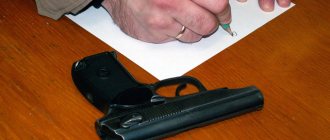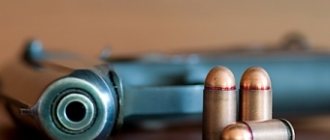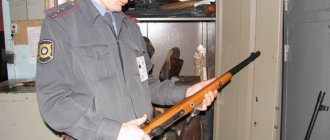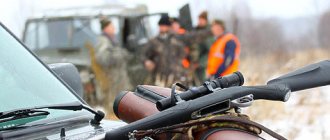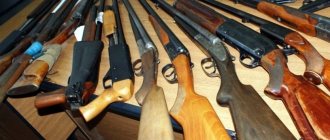The Code of Administrative Offenses and the Criminal Code of the Russian Federation establish liability for illegal possession of weapons. For a person, the difference is colossal. Or administrative punishment. Or a criminal conviction. Therefore, in this publication we will also talk about violation of storage rules, when there is an administrative offense. And about such violations when illegal storage becomes a crime. Rules for storing weapons at home are also posted on the website.
Legal basis for owning trauma equipment
The main law, which regulates the rules for the purchase, sale and storage of traumatic weapons, has been in force since 1998. Subsequently, the Weapons Law underwent changes.
In accordance with this law, persons who own traumatic weapons must obtain a license. Despite the fact that this weapon is referred to as “limited destruction”, licensing is mandatory.
Thus, the legislator developed a method by which he gave the citizen the right to legally buy and use weapons.
What storage is considered illegal?
The licensing procedure consists of a series of steps that formally confirm that a candidate meets legal requirements. Having prepared a set of documents, the civilian requests permission to purchase trauma equipment. After purchase, the weapon must be registered within a certain period of time - with the parallel issuance of a license. If this is not done, the actions of the violator fall under the article on illegal trafficking of weapons.
The “Weapons Law” specifies not only the owner’s licensing obligation, but also contains standards for traumatic weapons. By definition, this is a firearm barrel designed to hit a target with special cartridges. The weapon is not intended for shooting at a living target, causing significant harm.
The energy of the traumatic muzzle should not exceed 91 J. A special requirement is placed on both the pistol clip and the revolver cylinder. Magazine capacity is no more than 10 rounds. In this case, there may be two trigger mechanisms. This means that the pistol fires by self-cocking, but does not fire in automatic bursts.
Government Resolution No. 814, edited in 2022, is important. This act approves measures to control the circulation of civilian weapons. In addition, it has been established that citizens of the Russian Federation have the right to purchase and carry traumatic weapons in order to ensure their safety. The same document lays down the rules for the circulation of weapons.
Basic information
The legislation of the Russian Federation allows the use of traumatic weapons in public places along with shockers, sprays and other means of self-defense. However, there is a list of situations in which you cannot carry such a weapon:
- rallies, demonstrations, public holidays;
- churches;
- educational institutions (except for military educational organizations and other similar institutions);
- cinemas, restaurants, bars;
- shopping centers.
Such restrictions do not affect people who are officially responsible for ensuring the order and security of such places and events.
The characteristics of traumatic weapons include the following:
- “drum” capacity – up to 10 rounds;
- maximum muzzle energy when fired – <91 J;
- used only for self-defense and exclusively with traumatic cartridges.
Most often in Russia, firearms of limited destruction are used - for example, a pistol, a barrelless device. Sometimes smooth-bore firearms with traumatic cartridges are used.
You cannot carry traumatic weapons in Russia in 2022 without permission.
Responsibility for illegal storage and carrying
The following sanctions are imposed for illegal possession of traumatic equipment:
- In case of violation of storage rules, a fine of 2 thousand rubles is issued. The item itself is subject to confiscation until its former owner eliminates the violations.
- When weapons are purchased and stored outside the law, they are usually not licensed. For this violation, a fine of 3 to 5 thousand rubles is imposed. In addition to the fact that the item itself is confiscated permanently, the citizen faces administrative arrest.
- If the license has expired, the citizen who previously issued it receives a warning. A fine of 3 thousand rubles may also be imposed.
Note. There is no provision for criminal prosecution for illegal possession of traumatic equipment.
When you need to transport a traumatic weapon, for example, in a car, you must follow the established rules. It is transported separately from the cartridges, packed in a case.
Violation of registration deadlines
This is not a very serious offense because the gun owner did not intend to break the law, but was negligent. Be that as it may, responsibility for the delay still occurs.
One month before the permit expires, the owner should contact the OLRR. The application for extension is written according to the form. If you miss the deadline while the document is still valid for several days, a fine may be imposed.
Responsibility for missing the deadline for registering injuries is prescribed in Article 20.11 of the Code of Administrative Offenses of the Russian Federation. It says that for failure to comply with the deadlines, and in the event that the permit has not been renewed, a fine is provided. The amount varies from 1,000 to 3,000 rubles.
As practice says, in case of delay of several weeks, a minimum fine is imposed.
Long-term violation of deadlines
If the deadline for issuing a permit has long expired, and the body that carries out control has become aware of this, a more severe sanction is provided for storing traumatic substances.
The owner’s actions are qualified under Article 20.11 of the Administrative Code. In this case, the amount of the fine will be maximum. The whole difficulty is that the legislator has not determined whether the offense is intentional or unintentional.
As judicial practice shows, violation of deadlines of several years falls under a more stringent article. According to Article 20.8 of the Code of Administrative Offences, a penalty is imposed if the owner has violated the rules for the circulation of traumatized goods. So, if a person keeps a weapon in his apartment, one of the types of penalties may be imposed on him.
Scroll:
- Fine from 3,000 to 5,000 rubles. The weapon is subject to confiscation until the permit is reissued.
- Temporary confiscation of weapons. In this case, administrative arrest is possible, the duration of which is determined individually. Minimum - 5 days, maximum - 15 days.
- The official pays a larger fine. The amount varies from 10 to 50 thousand rubles. Along with a fine, a person is deprived of the right to re-issue a permit for a period of up to 3 years. In addition, the weapons themselves are confiscated.
However, the matter is unlikely to come to an arrest. However, the owner will remain without a weapon. He will have the opportunity to re-register everything and pay the fine. The responsible person conducts a conversation during which the offender is explained the importance of complying with the law.
Responsibility for an expired license
While the documentation is being prepared, storage of the injury is not legal. Therefore, documents should be renewed in advance, that is, two to three months before the moment when the license becomes invalid.
It should be noted right away that there is no criminal liability for expired licenses. However, a fine will most likely be imposed. This violation of the law falls under various articles of the Administrative Code.
The validity period of the obtained license is 5 years. The speed of obtaining a license depends on the work of the LRR department, but it is better for the owner of a trauma vehicle to worry about it in advance.
List of documents:
- copies of passport;
- 2 photo cards; medical certificate;
- valid license.
Amounts of fines
An expired license cannot be hidden for long. The district inspector has the right to require permission for the trunk. Failure to obtain a license will result in a fine, the amount of which is determined by the court. However, the amount varies from 500 to 2000 rubles. As a rule, the amount of punishment is directly proportional to the period of delay.
No license
What awaits a citizen who keeps trauma equipment at home but does not have a license? It is difficult to answer this question unambiguously.
Responsibility for not having a weapons permit arises as a result of the actions of a person, as well as due to a coincidence of circumstances. There are different situations that lead to the illegal trafficking of trauma products.
Let’s look at examples from real-life situations in order to then select exactly those articles of the Criminal Code or Code of Administrative Offenses that apply to them.
Situation #1
The citizen legally purchased a traumatic pistol by presenting a permit document. In addition, he officially registered the weapon. But circumstances turned out to be such that the license turned out to be expired. Therefore, from the moment of its termination, both storage and carrying of weapons is prohibited. Then the citizen reissued the document out of fear of incurring liability. At the same time, the period of delay has only increased. Some citizens go so far as to say that the delay is not months, but years. As practice says, it is the timing that influences the consequences. The court evaluates the citizen's intention to become law-abiding, or the lack thereof.
Situation No. 2
The gun buyer did everything legally: prepared documents and received permission. However, after the purchase, he did not register or issue a license. Thus, by ignoring the instructions, he seriously violated the law. Shadow ownership of weapons cannot be hidden from the authorities for long. And if law enforcement officers don’t catch you red-handed, “good neighbors,” for example, can report this fact. In addition, you cannot purchase goods in a gun store without permission. The offender can, of course, buy the barrel second-hand. However, this is again a disregard for the law, since the transaction is illegal. This risks the fact that the owner of an illegal weapon may be prosecuted for selling it, which smacks of criminal prosecution.
To better understand the situation, we recommend taking a look at weapons forums. Their visitors raise issues related to illegal storage and carrying of traumatic weapons. Reading the discussions, it seems that each violator has objective reasons that prevented the legalization of weapons. In fact, there was simply irresponsibility, if not outright disregard of legal norms.
Illegal acquisition of weapons
The state suppresses the storage and carrying of weapons purchased on the “black” market.
According to the letter of the law, possession of traumatic equipment without permission entails administrative liability. However, the authorities are concerned about the spread of shadow arms trafficking. Indeed, crimes are more often committed using guns without registration. The fact is that inexpensive trauma weapons can be relatively easily converted into combat weapons.
The outcome for the owner who acquired a traumatic gun without documents and at hand may be different. The investigation takes into account active cooperation. The worst-case scenario is being accused of selling illegal trauma products. The punishment is prescribed in Article 222. The maximum fine is 80 thousand rubles. However, they can also be deprived of freedom for 4 years.
The distribution of responsibility according to the codes (Criminal Code and Code of Administrative Offenses) is most often uniform. But in practice, cases are different.
Advice. Illegal actions related to the circulation of weapons are severely punished, and therefore the owner of the weapon should be vigilant, that is, follow the storage rules.
Compliance with the rules for using LLC
The following rules for storing and carrying traumatic weapons are relevant for 2022. If permission is granted, please remember that:
- Additional devices - installation of silencers and night vision devices on traumatic weapons is prohibited;
- Where not to wear. Carrying traumatic weapons in public places (restaurants, cafes, medical and educational institutions) is unacceptable. The exception to these rules applies to security guards;
- Wearing OOOP is prohibited for those who are intoxicated. In this case, the fact of using a traumatic weapon is not necessary; for the onset of liability, it is enough for a drunk person to have it with him;
- How many pieces can you have? You can use only 2 (two) units of weapons with traumatic effects;
- In what form to have it with you. Legally carrying a traumatic weapon means that its owner has the weapon on with the safety on and without chambering a cartridge. If the traumatic weapon is long-barreled, then it must be carried unsheathed, while short-barreled weapons must be carried in a holster;
- Weapons can only be used in defensive situations: in case of danger, first fire a shot in the air and only then can you use the weapon to neutralize the attacker;
- Storage. The owner of a weapon is obliged to store it in a safe specially designed for this purpose.
Simply having a safe is not enough to meet all gun storage requirements. The owner ensures that the traumatic device is not accessible to anyone living in the house. In the event of your absence at home, family members should not present “injuries” to an employee of the Russian Guard, otherwise an administrative offense will occur.
What traumatic weapons do not require a license?
Weapons that are sporting or domestic models do not require a permit. Typically, pneumatics are used as a means of self-defense. This is a pistol-type self-defense device.
Characteristics:
- initial bullet speed no more than 150 m/s;
- shot force - maximum 7.5 J;
- caliber – 4.5 mm.
Important! If the power of a weapon is more than 7.5 J, then it is subject to registration by law.
There are many variations of pneumatic guns on the market, but the law limits their use as a means of self-defense.
Pneumatic weapons are suitable for sporting events, but they are ineffective against living opponents.
Due to its simplicity of design and availability, pneumatics have more advantages.
Advantages and disadvantages
Suitable for carrying in a handbag.
Externally, the trunk looks like a real one, which has a psychological effect.
It is useless in the cold season, since it only has a psychological effect.
Storage rules are simple. It is better to keep the pneumatic barrel in a metal safe. At the same time, we must not forget to put the safety on, because this relieves the spring tension. This is important if the weapon needs to be put into action quickly.
Other types of weapons that do not require a license
According to the Law “On Weapons” 150-FZ, it is allowed to purchase low-power weapons for your own safety.
Without permission and a license, you can not only buy self-defense tools, but also carry them on your person.
Note. Information about caliber and muzzle energy is indicated in the certificate included with the product.
For the purpose of self-defense, Russians more often purchase pneumatic guns, the muzzle energy of which does not exceed 3 J.
Procedure for obtaining a license
A citizen who decides to purchase a trauma vehicle must be 21 years old.
Algorithm of actions:
- Step 1 - undergoing a medical examination. You should contact the state medical institution that is authorized to issue certificates in form 046-1. It is required to undergo an examination by a therapist, psychiatrist, ophthalmologist and narcologist. The certificate is valid for 1 year. The service is paid.
- Step 2 - training in paid courses. Their program is devoted to the use of traumatism. You can find out exactly where such training is organized by contacting your local police department. The institution must have a permit to conduct exams. Course duration is from 12 to 15 hours. During the process, program participants will learn how to purchase weapons, how to use them later, and what punishment will follow for illegal possession. The basics of dealing with trauma are learned in practice.
- Step 3 - submit your application. The citizen submits this document to the licensing and permitting department. You should contact the local police department at your residential address.
What documents are needed to obtain a permit?
To obtain a trauma license, you need to collect documentation.
The package includes:
- a statement written in the prescribed form;
- a copy of an identity document;
- a pair of 3x4 photographs;
- bank check confirming payment of the duty.
Then, in order to obtain permission for trauma, you must add:
- certificate of completed courses and examination grades;
- medical certificate in form 046-1;
- a check from the bank confirming payment of the state duty.
Before applying for a permit, you must study at an accredited institution. Then be sure to undergo a medical examination. You should also purchase a safe that is attached to the wall and locked with a combination lock. Only after completing these steps can you go to the local police officer so that he can conduct an inspection on the spot and issue a report.
The cost of training is 5,000 rubles. Not everyone passes the exam on the first try. The number of retakes is not limited, but you will have to pay an additional 1000 rubles each time.
Expenses:
- medical certificate - 1500 rubles;
- the amount of the license fee is from 500 to 2,000 rubles (+50 rubles/form);
- The fee for a permit for trauma is 100 rubles.
How to renew your license
If, due to a combination of circumstances, it was not possible to purchase a traumatic trunk within six months, the license ceases to be valid.
The legislator did not provide for the possibility of an extension. This means that the registration procedure must be initiated again.
If the permit is refused
If all conditions provided by law are met, obtaining a license will not take a long time. To speed up the procedure somewhat, you can contact specialized commercial centers that organize the collection of documents for a license.
However, the absolute grounds for refusal to issue a special permit are:
- age less than 21 years, there are contraindications related to health conditions or the exam has not been passed;
- persons who do not have a specific place of residence;
- there are violations of hunting rules;
- a conviction for committing an intentional crime of any nature has entered into legal force. The type of punishment does not play a significant role in this case, while at the same time, only the outstanding criminal record matters for refusal;
- committing, within 12 months by the time of applying for a license, at least two administrative offenses related to an encroachment on administrative order (or public order);
- prisoners who, at the time of applying for permission, are serving a sentence of imprisonment for committing a crime.
For example, all the necessary documents sufficient to obtain a permit have been collected. But the appeal was later, say, a year later. The issuance of a license will be refused due to an expired medical report (valid for 1 year).
If the issuance of a license is refused unreasonably, the actions of LRO employees are appealed to the court. Such cases are isolated, since an exhaustive list of requirements for the recipient of a license eliminates any ambiguities in the application of the law.
